#happy mothers month to all the pagan wiccan and witches moms
Text
The First Time I Saw To Gaia: The Mother of All of Us
(In May, there are many dates to celebrate Mothers around The World; [The ones than really love and care for their Sons and Daughters, I mean...] so I decided put this post, to celebrate to all the Loving Mothers; Specially to all Pagan/Wiccan/Witches Moms out there, and... To Gaia!)
My first image of Gaia, as represented in Ancient Art; was an sculture where she looks as a young adult with a thick braid around her head, with the rest of her hair down; with a simple tunic till her knees, barefoot and smiling; and in position of running: It was the first time I saw the sculture, but... It felt familiar, to me!
But... I had to wait four years more, to saw to the real Gaia; in person...
...It was weeks after my family moved into a new house, than one night; I have this vision:
I was in the higher part of an incline cliff, than its lower part; ended in a beach and in the sea. I have a white simple ancient greek dress till my kness, and I saw to all The Gods and Goddessess closer to me, than were standing in front of me; and suddenly... They turned their head in direction to the sea, and they divide to two files with enough room to leave than someone could walk between them with easy, and as soon they left that space between them; they started to kneel slowly, and closed their eyes: Athena, opposite in front of Loki; and many did the same. (I apologize, if I don't remember this part; well: It was a very long time ago!) I was wondering, what was the cause of this ''Odd behaviour''; 'cause they did this gesture, with a solemnity and genuine affection for the one than will arrive soon to that place; than looks incredible and unexpected for me: ''WHO, could have earned such Respect; Devotion an Love, than could makes to Gods and Goddessess of so different cultures; to kneel in expectances of their arrival?!'' Was my thought at that moment.
And then... I saw Her!...
I saw from the lower part of the cliff, walking toward me with elegance and in a slow pace... A 25 years old woman with dark red hair and eyebrows; slightly tan skin, dark green eyes, red lips, thick dark eyelashes; medium size body, wearing a tunic of three colors; (brown on top, bright red at the medium of her body; and bright green in her skirt) her hair in a medium thick red braid surrounding the rest of her free down hair, always barefoot, and... Like visible pregnant, like she was about to give birth in a matter of days; or weeks! Her energy was warn and tender, and really strong too; and I realized than everytime she touched the ground with ever step of her bare feet, …Green grass and wild little flowers started to grow in a fast rate, under her feet.
I was so in awe, than I totally forgot to kneel! (...But, she didn't seemed to be offended for this act) She looked at me, and smiled me in the same way a mother smiles to a dear son/daughter; and I returned the gesture, genuinely.
…I felt, like I hasn't felt since I was a little girl: I felt, like I was in Home!
Gaia, appeared to me in moments I didn't think she will appeared; or... When I thoughted ''Why she will appeared, if nobody else seems to care how I really feel about me; or my problems?!...''
When I was alone in my room at night, and have felt evil spirits near of me... Gaia appeared, and they left.
When some relatives and/or people mock me, or disrespect me; and I have felt sad and angry... Gaia appeared, and showed me support with her mere presence.
When I dreamt with an relative than passed away, and I felt things were turning bad in the dream... Gaia appeared, and she calmed my fear with her voice; and protected me till I awaked!
When I felt hopeless, when I hear and/or saw people treating badly to any than is a good person; but than is different... Gaia appeared, and told me than any person than is good at heart; despite their way of dress, how they look; what they own, what they believe, or even; to who they like or love... All are Gaia's Children! AND...
When my ex-friends showed me disrespect, mocked my beliefs; they acussed me falsely, and my whole world, (And Friendship) ended... Gaia appeared in front of my bed, while the other Deities were around my bed, and a few sit next to me; and two were hugging me while I cried... She was there like telling me, than I will never being alone; 'cause she will always watch over me.
Gaia, is a Goddess than is always there when you need Protection; Consolation, Divine Justice, Motherly Love; Someone to gives you their strenght to go on in life, Words of Comfort, and even: a wise advice you didn't knew you was so needy to hear, until she said it.
That's all in this post, and remember: Gaia, is our mother; and she is always at the reach of a heartbeat, like most mothers are! (And, if she doesn't appeared in your room/house soon; after you called her... Take a walk in any natural and beautiful setting, or in an outdoor park: Is more than probable, than you may find a sign of her; or even... You could ended having a brief first encounter with Gaia!)
Than Gaia, (And all The Goddesses that are Mothers) always help us with their Strength and Power; to overcome hard times in life, and to return to the Peace; Light and Happiness... So Be It!
#pagan writings#pagan advice#pagan goddesses#pagan goddess gaia#greek goddess gaia#gaia deity#gaea deity#happy mothers day to all the pagan wiccan and witches moms#happy mothers month to all the pagan wiccan and witches moms#pagans#pagan#eclectic pagan#ecletic pagan#hellenic pagan#lokean#pagan from the caribbean
2 notes
·
View notes
Text
I’m a Witch.
Witch.
Why use that word? Mostly, because it's true.
Also, because it's an incredibly important word.
As Madeline Miller explains in her brilliant Guardian article, From Circe to Clinton: why powerful women are cast as witches, the word witch "reflect[s] our ideas about women back to ourselves." This lone syllable is a palimpsest of information about women's history: forms of feminine power, fear of feminine power, and the independence of women who hold power.
I learned I was a witch at age 11. Unfortunately, not by owl.

When I was 9, my progressive Episcopal school hired a remarkably conservative pastor. He taught my third grade Bible class that women were inferior members of the Christian faith. Convinced of my equality, I fought him openly. When the class reached Corinthians, I was exiled to the hallway.
Fortunately, I also spent that year studying Scandinavian history and mythology. I thus realized that pre-Christian spiritual alternatives existed, but the old gods still seemed distant, found only in fairy tales and books of ancient history.
Two years later, I stumbled on a curious volume at a used book fair. It was pink, with an picture of a beautiful woman on the cover and a compelling title: The Holy Book of Women's Mysteries. I took it home and devoured it in one sitting.
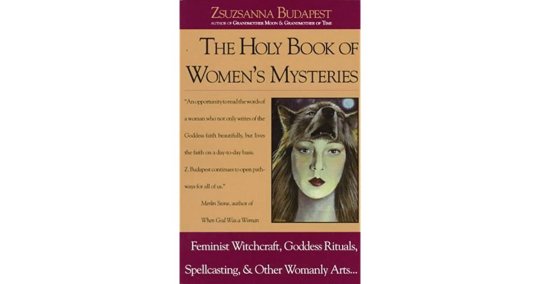
Running into my mother's bedroom, waving the book like a flag, I hollered, "Mom! I understand now! I'M A WITCH! Everything makes sense!" I was deliriously happy.
My mother lowered her newspaper and said levelly, "OK. But you can't ever say that to anyone else. They won't understand."
If you've met me, you know I'm a rules-follower. (Well, except when my Bible teacher tells me to accept my subservience.) I didn't speak the word "witch" to anyone else for nearly ten years.
Yet, I was a lucky wee witch: I had little supervision, an allowance, subway tokens, and all of New York City at my disposal. I bought a tarot deck at a comic book shop, made a wand from a branch found in Central Park, taught myself to meditate, and spent hours on the floor of Barnes and Noble devouring feminist classics and occult texts.
I paid scant attention to pop cultural depictions of witchcraft. It seemed a bit dangerous: would my curiosity indicate that I was, indeed, a witch? Also, I didn't want to get my information from Willow. I wanted real magic.
When I reached Duke University, I found a trove of resources in the Divinity Library, which was often empty and had a forgotten copy machine in the basement. I studied there, Xeroxing whole chapters from Doreen Valiente's works after I finished my homework.
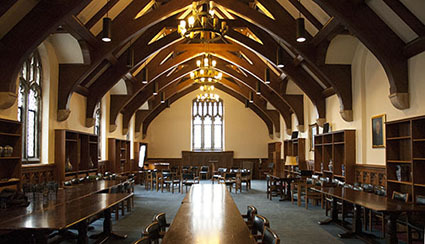
I also found mentors: a married pair of witches raising their young daughter in the craft. They took me in, filled the many gaps in my knowledge, taught me how to perform rituals with proper tools and other witches, and coached me through many challenges. But they practiced in secret, because North Carolina wasn't a safe place to be a witch in the 1990s. So I practiced in secret, too.
Until I met my husband. Nominally Christian, he was remarkably sanguine about my beliefs and befuddled by my secrecy. We spoke Methodist vows at our wedding, but did so bathed in sunshine and surrounded by flowers, bees, and butterflies, so that I could feel the presence of the divine.
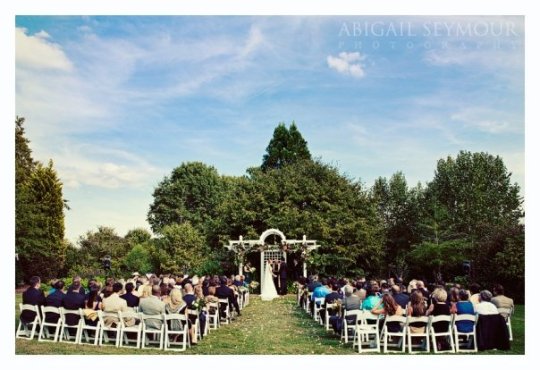
I stuck a toe out of the broom closet after my daughter's birth. As her primary role model, secrecy and sneaking around seemed like a terrible precedent to set. We decided to become an interfaith family: our daughter was baptized, but also included in my observances. Today, we celebrate all pagan holidays and some Christian holidays. Openly.
Yet, I didn't really leave the broom closet until we moved to Asheville, where I found allies, resources, and wise teachers including Byron Ballard, Becky Beyer, Sarah Chappell, Maia Toll, Jodi Rhoden, and Katie Vie. When I stopped hiding, I found my tribe.
--
So, what do I believe now?
Animism
I am an animist, which means that I perceive all natural things - rocks, plants, trees - as in some way alive. I also believe in divine immanence - an organizing force in the universe that is both holy and present in all natural things. I believe we can perceive divine order in the patterns of sacred geometry - pentagrams, spirals, stars, whorls, the Fibonacci sequence. (Here, let Donald Duck explain!) Thus, I believe nature is to be cherished, protected, and venerated.
Views about classic theological questions - the soul, the afterlife - vary widely among animists. Personally, I think our bodies and consciousness return to nature, but I really don't know what that means. I doubt my mind is capable of understanding it.
Paganism
Paganism is a polytheistic religious practice. I believe it is difficult for the human mind to approach the divine without some organizing principles. Gods, goddesses, myths, and stories help us conceive of the divine in a concrete way. Forming a relationship with one of these manifestations is a way to venerate the divine in the material world.
Views about classic theological questions vary as widely as you might expect among pagans. We have a "family goddess" and organize our veneration around her symbolism and incarnation.
Witchcraft
Witchcraft is a practice, not a religion. Thus, one can be pagan and a witch, pagan but not a witch, and a witch but not a pagan. I happen to be both. There are too many strands of witchcraft to list here.
Witchcraft, as I define it, is the practice of magic.
I think of magic as the conscious direction of intention on the material world. My practices are informed by Reclaiming, Norse, and Dianic Wiccan practices. (But I no longer use materials created by trans-exclusionary authors.) I'm also starting to learn about Appalachian folk magic, since I'm surrounded by it. However, I also think of magic and science as a spectrum: magic can be defined as a collection of observed (and still somewhat fuzzy) knowledge that has been passed down along generations but not incorporated into the laws and rules of "science." I read Sagan and Einstein along with spell books.
My daily spiritual practices include meditation; reading tarot; caring for our land; invoking, spending time in the presence of, and making offerings to our family's matron goddess; working on our family altar; casting spells; and taking classes in herbalism, mysticism, or history. Special spiritual practices are reserved for holidays known as sabbats and esbats.
Sabbats are the eight holy days observed by many Euro-American pagans and witches. They represent spokes on the Wheel of the Year. These are holidays for our family, and we have special traditions associated with each. Many are revivals of pre-Christian festival days, and fall close to popular holidays. Samhain is one of the holiest days of the year, often referred to as "The Witches' New Year." Yule is a lot like Christmas, so our family observes a full week of wintry celebrations. Imbolc is the return of the sun, a better version of Groundhog Day. Ostara is very similar to Easter. Beltane is May Day, and my daughter's school actually celebrates a version of it with costumes, maypole dancing, treats, and games. Summer Solstice, or Litha, is a time for staying up with the sun, catching fireflies, drinking champagne in the grass, and making strawberry shortcakes. Lammas is the first harvest festival; we visit local farms, make bread, and learn about food systems. Mabon, or Autumn Equinox, is the big harvest festival, and I see it as the kickoff of the "season of the witch," when everyone is getting ready for Halloween and I can luxuriate in feeling normal for a month! We carve pumpkins, pick apples, and decorate like love children of the Addams and the Griswolds.
Esbats are rituals held at the Full Moon and New Moon. These are special times for holding rituals and casting spells, so I set up a small ritual for my daughter wherein I teach her some new skill like grounding or casting a circle. Then I do my own rituals and spellwork after she's in bed.
--
My decision to leave the broom closet was informed by (1) a new sense of safety, because witchcraft is extremely popular right now, but also (2) a new sense of responsibility, because of the misogyny unearthed in the 2016 election.
Clearly, the election itself was informed by a persistent hatred of powerful women. "Witch" played a strong role in misogynistic descriptions and depictions of Hillary Clinton. For younger women, especially witches like myself, this was alternately infuriating and thrilling. It was both a denigration of us as individuals and a recognition of our political power.
As Kristen Sollee has explained, “Witches have always been politically radical, in my opinion, but it seems that even more American witches are these days because the internet allows for a new kind of organizing on a larger scale." After the election, activist witches began to organize, often via the internet or in spaces created by feminist entrepreneurs. W.I.T.C.H's many outposts. Intersectional feminist events at Hauswitch, Catland, Ritualcravt. (And many more I'm surely leaving out.)
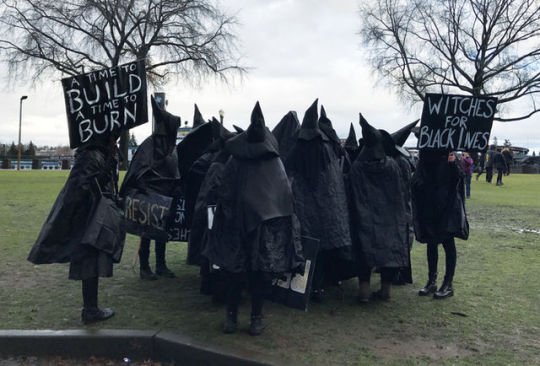
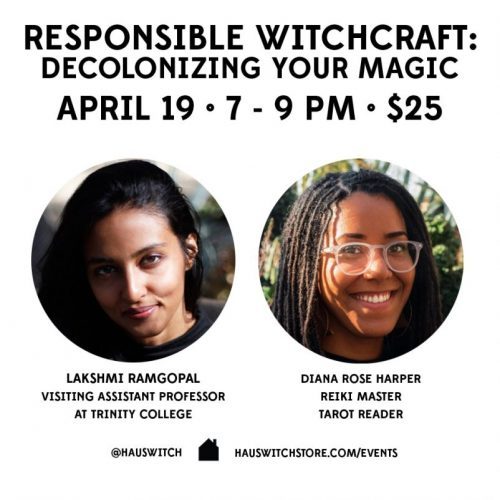
Women who were witches - and women who weren't - began to see themselves reflected in the activism of witchcraft.
Then Donald Trump co-opted the term "witch hunt." It rang hollow. As Josephine Livingston said:
On the one side, we have the young woman. Her natal chart is fully indexed; she can read tarot. She knows that Planned Parenthood guards her liberty. Her interest in witchhood is bound up with her political conscience, gender identity, and sense of humor. On the other, the President of the United States. His witchhood is, by contrast, a simple claim: that enemies hunt him for no good reason.
Like Livingston, I believe that "the only sorcery effective against him is solidarity: more magic, more craft, more witches."
If you can hex, do it.
If you can work to regenerate the earth, do it.
If you can bind, do it.
If you have the power of persuasion, use it.
But above all...
If you're a witch, use the word.
It's a powerful word. It rings with history, beauty, pain, and magic. We could all use a little more magic right now, by which I simply mean a little more intention in our relations with the material world, and a little more faith that our intentions matter.
Then, as Miller asks, "perhaps we can at last celebrate female strength, recognising that witches – and women – are not going away."
“We are the granddaughters of the witches you could not burn.” It’s not a biological claim. It’s a tribal cry of belonging. A recognition of my powerful foremothers, the women who were called “witch”: Cleopatra, Joan of Arc, Anne Boleyn, the herbalists, the alewives, the midwives, Hillary.
I’m a witch.
3 notes
·
View notes